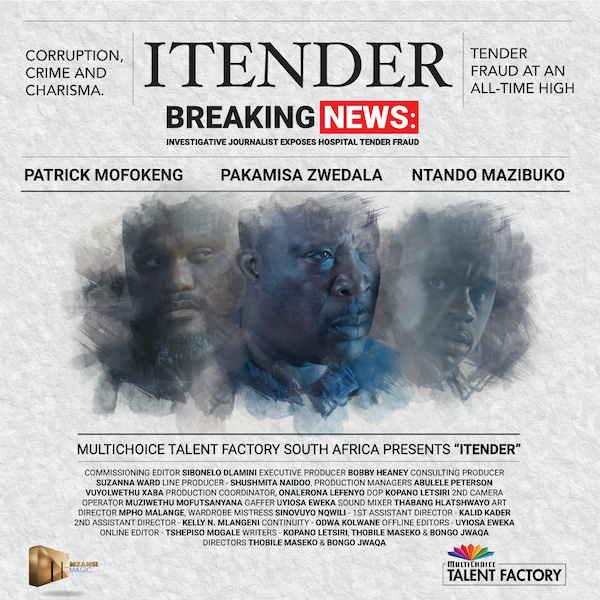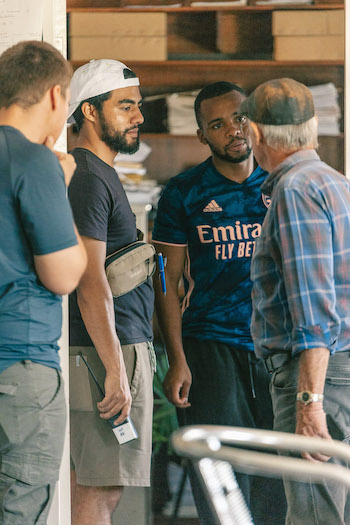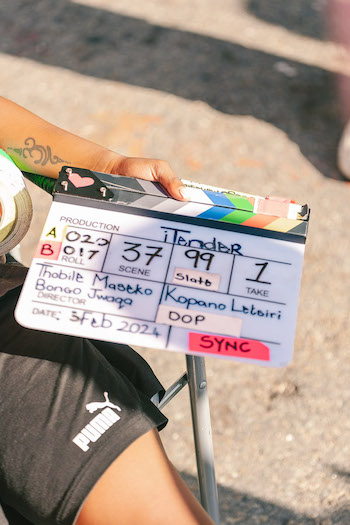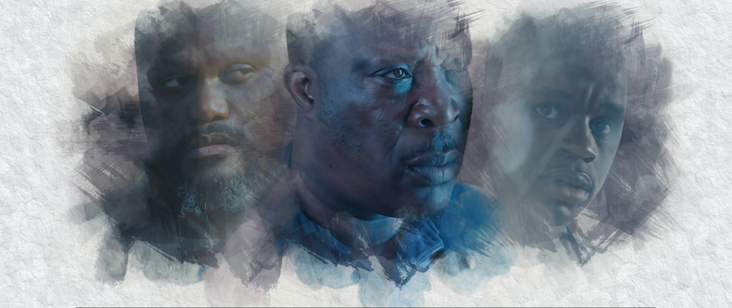It was one of the most powerful stories of 2023. Babita Deokaran was assassinated on 23 August 2021. Two years later almost to the day, six men were found guilty of her murder. Deokaran was a whistleblower, who blew the lid off fraud and corruption at Tembisa Hospital, and died as a result.
On Saturday night, the film iTender premiered on Mzansi Magic. Starring Patrick Mofokeng and Ntando Mazibuko, iTender is a film by youth creators from the MultiChoice Talent Factory. It was inspired by Babita Deokaran’s story.

Head writer and and director of photography, Kopano Letsiri, says the film is close to his heart. “Babita Deokaran, the healthcare whistleblower was assassinated in broad daylight, in an area I grew up in, with beautiful childhood memories.
“The story of why she was assassinated left a lot questions on the state of our country and the rot of corruption that has taken over. The conditions of public hospitals are alarming and when someone speaks out about the root of the rot, they are silenced.”
Current affairs
iTender’s protagonists are investigative journalist Aaron and his son Lethabo, a doctor at the fictitious Sizani Hospital. Aaron uncovers a tender fraud case and with the help of his son, Lethabo, a doctor at the same hospital, he risks everything to expose the truth behind the corruption that hits too close to home.
“During our conceptualising phase we spent a hefty amount of time researching Babita Deokaran and the Tembisa Hospital PPE scandal,” says Letsiri. “We watched a documentary called Silenced: Why Babita Deokaran was Murdered by Jeff Wicks and the News24 team. We also critically analysed the articles that followed, highlighting the key players in the case of the Tembisa Hospital PPE tender fraud.”
The young filmmakers emphasise the importance of accountability and the pursuit of truth in terms of the impact you hope the film has.
“With election season currently taking place, it’s important to remind our audience about how our leaders have dropped the ball on many occasions,” says Letsiri.
“It was important for me to create a story that reflects our current society and its dire climate. The story is a reminder to our audience that the power is on our hands and it’s important for us to vote wisely, to have leaders who are accountable, and to have leaders who care about our beautiful country and its citizens,” he adds.
Youth influence on storytelling
 Asked if the youth are influencing the kinds of stories being told, ones that tackle South Africa’s many issues head-on, Letsiri says this is 100% true.
Asked if the youth are influencing the kinds of stories being told, ones that tackle South Africa’s many issues head-on, Letsiri says this is 100% true.
“I think we’ve seen our parents and grandparents lose hope in the future of our country, holding on to what our country once was and not understanding the impact of our current reality.
“I think as the youth, we still have a lot of faith in our country and it’s up to us to continue fighting for it,” he says.
The film industry isn’t an easy industry to tackle, to make your mark. How important are structures such as the MultiChoice Talent Factory in finding, building and exposing talent?
“The Talent Factory exposes us to the ins and outs of the South African film and TV industry, something we aren’t really taught in film school and our respective institutions of higher learning,” Letsiri explains.
The role of mentorship
“I’m grateful to have been mentored by Bobby Heaney who has a wealth of knowledge in the industry. We come into the Talent Factory as rough diamonds and throughout the academy, we’re taught how to channel our creativity into meaningful and impactful storytelling.”
But once out of that creative and nurturing environment, the young filmmakers have a lot to deal with. It’s a tough world.
 “It’s important to be resilient when trying to break into the industry. The skills I’ve learnt leaving the academy is having a basic understanding of production, sharpening my eye from a cinematography perspective.
“It’s important to be resilient when trying to break into the industry. The skills I’ve learnt leaving the academy is having a basic understanding of production, sharpening my eye from a cinematography perspective.
“I’ve also learnt the intricacies of casting coordinating, being the middleman between the production and cast throughout the duration of the shoot,” Letsiri says.
“The big take-away from the academy for me has been understanding how to write a story or concept for a South African audience. Understanding the requirements from commissioning editors for a story to appeal to a certain niche market or, the mass audience at large,” he says.
But as he points out, “I’ve walked away from the Talent Factory having written my first movie that will be aired on national TV, an experience that will remain with me for the rest of my life. I’ve also managed to build a network with creatives with vast experience in the industry and I’m hopeful that I’ll be able to reach out to them to continue building my career.”














